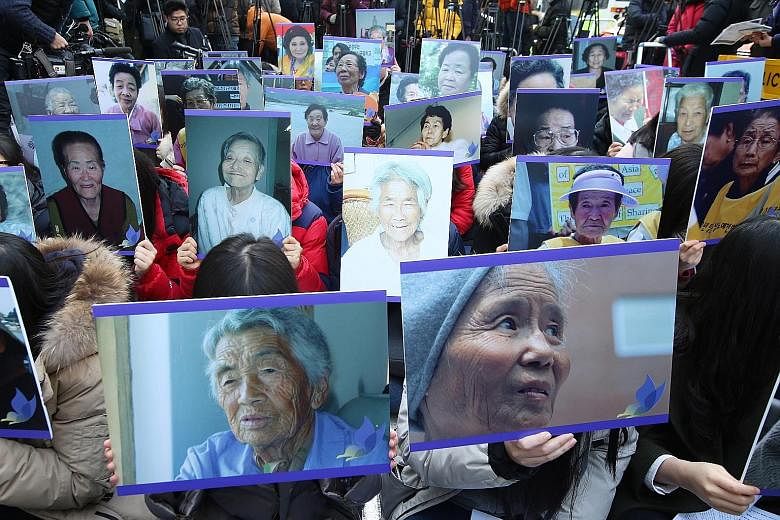SEOUL • Former comfort women and hundreds of supporters protested yesterday against South Korea's agreement with Japan on wartime sex slavery, as Seoul faces an uphill battle to sell the deal to the public.
Some 250 protesters gathered next to a statue outside Japan's Embassy which symbolises Korean women forced into Japanese army brothels during World War II.
They waved banners and chanted slogans, dismissing Monday's deal as "humiliating". Japan offered an apology and payment of one billion yen (S$11.4 million) to the 46 surviving South Korean women under a landmark agreement which both nations described as "final and irreversible".
The plight of the so-called comfort women is a hugely emotional issue that has for decades marred ties with Japan, which ruled the Korean peninsula harshly from 1910 to 1945.
The deal has sparked anger from some of the victims and activists, who took issue with Tokyo's refusal to accept formal legal responsibility for the sex slavery.
Japan said the payment of one billion yen was aimed at "restoring the women's dignity" but was not official compensation.
"The fight is still on," survivor Lee Yong Soo, 88, said at the rally, attended by one other victim and about 250 protesters.
There have been weekly gatherings near the statue for years, with protesters demanding Japan's formal apology and compensation.
"We will continue to fight to make Japan take formal legal responsibility and apologise so that victims who have already perished will have justice," Ms Lee added.
The mood was sombre as nine former sex slaves who died this year were commemorated. It later turned angry, with protesters shouting slogans denouncing Japan and Prime Minister Shinzo Abe.
Demonstrators held portraits of the former victims and waved banners condemning the deal, particularly Seoul's pledge to try to remove the statue from outside the embassy.
"Cancel the humiliating agreement!" some chanted, waving banners that read: "Say no to relocation of the statue!" In the face of criticism, President Park Geun Hye has launched an all-out campaign to win public support for the deal. Senior officials on Tuesday visited shelters for the victims and pleaded for their support - a key step in securing broader approval.
The handful of comfort women who spoke about the agreement have mostly rejected it, but the views of the others are unknown.
But a recent poll showed 66 per cent of South Koreans overall oppose the relocation of the statue.
Ms Park has called for "understanding by the public and the victims" about the deal, which was warmly welcomed by the United States. It had long urged its two key Asian allies to make up.
The compromise agreement also drew a mixed reaction in Japan, with some far-right activists and newspapers criticising Mr Abe for offering the apology.
AGENCE FRANCE-PRESSE

